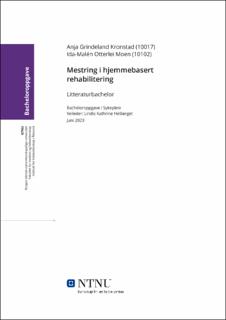| dc.contributor.advisor | Helberget, Lindis Kathrine | |
| dc.contributor.author | Kronstad, Anja Grindeland | |
| dc.contributor.author | Moen, Ida-Malén Otterlei | |
| dc.date.accessioned | 2023-07-21T17:20:55Z | |
| dc.date.available | 2023-07-21T17:20:55Z | |
| dc.date.issued | 2023 | |
| dc.identifier | no.ntnu:inspera:146721079:153069096 | |
| dc.identifier.uri | https://hdl.handle.net/11250/3080853 | |
| dc.description.abstract | Bakgrunn: Slagpasienters liv og hverdag endres brått ved akutt sykdom. Hjemmerehabilitering er et effektivt behandlingstilbud. Det er ikke avklart hva som er den beste formen for slagrehabilitering, men tidlig rehabilitering øker sjansen for å gjenvinne tapte funksjoner. Mestring er grunnleggende i rehabiliteringsprosessen.
Hensikt: Å belyse slagpasienters opplevelse av mestring i hjemmebasert rehabilitering.
Metode: Systematisk litteraturstudie med datamateriale fra ni kvalitative forskningsartikler.
Resultat: Analysen resulterte i tre sentrale hovedtemaer som beskriver hvordan slagpasienter opplever mestring. Temaene var støtte og nettverk, hjemmet som arena for rehabilitering og identitet. Pasienter verdsatte sosial støtte fra nære relasjoner og helsepersonell, samt å kunne utføre rehabiliteringen i kjente omgivelser. Slaget påførte pasientene belastning med konsekvenser for identitet.
Konklusjon: Rehabiliteringsprosessen er kompleks, og det kan se ut til at både støtte, omgivelsene og selvet har stor betydning for pasientenes opplevelse av mestring. Pasientene opplevde mestring ved støtte i form av kjærlighet og oppmuntring. Tryggheten i hjemmet og hverdagslivet ser ut til å styrke pasientens posisjon, som gir en positiv holdning og bevarer pasientens identitet. | |
| dc.description.abstract | Background: Stroke patients' everyday life change abruptly in the event of an acute illness. Home rehabilitation is an effective treatment option even if it’s not clear what is the best form of stroke rehabilitation. Early rehabilitation increases the chance of regaining lost functions. Coping is fundamental in the rehabilitation process.
Purpose: To shed light on stroke patients' experiences of coping in home-based rehabilitation.
Method: Systematic literature study with data from nine qualitative research articles.
Result: The analysis resulted in three main themes that describe how stroke patients experience coping. The themes were support and networks, the home as an arena for rehabilitation and identity. Patients valued social support from close relationships and healthcare personnel, as well as being able to carry out the rehabilitation in familiar surroundings. The stroke put a strain on the patients with consequences for identity.
Conclusion: The rehabilitation process is complex, and it may appear that both support, the environment and the self are of great importance to the patients' experience of coping. The patients experienced coping with support in the form of love and encouragement. The safety of the home and everyday life seems to strengthen the patient's position, which gives a positive attitude and preserves the patient's identity. | |
| dc.language | nob | |
| dc.publisher | NTNU | |
| dc.title | Mestring i hjemmebasert rehabilitering | |
| dc.type | Bachelor thesis | |
